
|
African Journal of Traditional, Complementary and Alternative Medicines
African Ethnomedicines Network
ISSN: 0189-6016
Vol. 8, No. 5s, 2011, pp. 1-12
|
 Bioline Code: tc11064
Bioline Code: tc11064
Full paper language: English
Document type: Research Article
Document available free of charge
|
|
|
African Journal of Traditional, Complementary and Alternative Medicines, Vol. 8, No. 5s, 2011, pp. 1-12
| en |
A Simplified but Effective Method for the Quality Control of Medicinal Plants by Planar Chromatography
Eloff, JN; Ntloedibe, DT & Brummelen, R van
Abstract
Three of the factors limiting the rational use of herbal medicine are uncertainty on effectivity, uncertainty on safety
and variation in quality of the product. Because many herbal medicines have been used over centuries by indigenous peoples,
the safety and effectivity is frequently not such a big concern. With more people collecting and distributing herbal medicine,
the offered product is however, frequently not what the label indicates either through a genuine mistake, but also through
fraud especially where expensive herbal medicine is concerned. Some wrong identifications have already led to serious side
effects and deaths. Planar chromatography or thin layer chromatography [TLC] is widely used to verify the identity of plant
extracts by determining the chemical fingerprint of the extracts. In a leading publication 17 different extractants, 41 solvent
systems and 44 spray reagents have been used to verify the identity of important herbal preparations. We investigated
whether a simplified system could not be developed to aid small laboratories in identifying different herbal medicines. We
compared the efficacy of different extractants, identified and developed three TLC solvent systems that would separate
compounds with low, medium and high polarity and then also investigated the use of several spray reagents. With acetone as
extractant and benzene:ethanol:ammonia [9:1:0.1], chloroform:ethylacetate:formic acid [5:4:1] and
ethylacetate:methanol:water [10:1.35:1] as TLC solvent system and vanillin-sulphuric acid as spray reagent the identity of 81
samples of more than 50 herbal preparations could be verified on the basis of the chromatograms. The same product from
different suppliers usually gave similar chromatograms. More importantly in several cases it was clear that products with the
same label were so different that a mistake must have occurred in the labelling. This method has found application in the
quality control of the most important African medicinal plants in the recently published African Herbal Pharmacopoeia
produced by the Association for African Medicinal Plant Standards (AAMPS).
|
| |
© Copyright 2011 - African Journal of Traditional, Complementary and Alternative Medicines
Alternative site location: http://journals.sfu.ca/africanem/index.php/ajtcam
|
|
